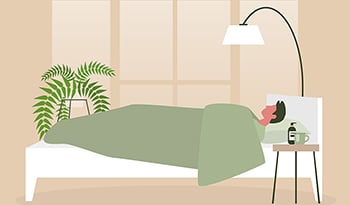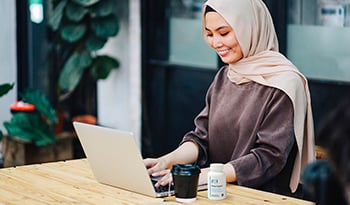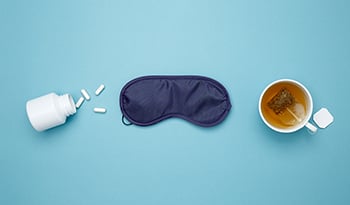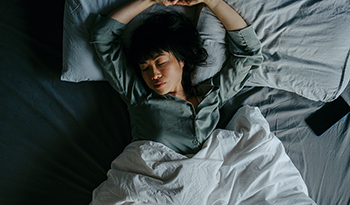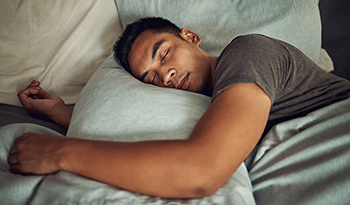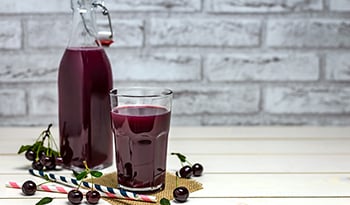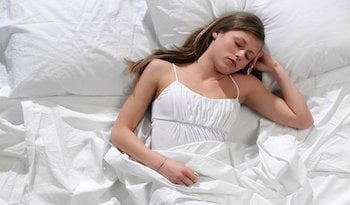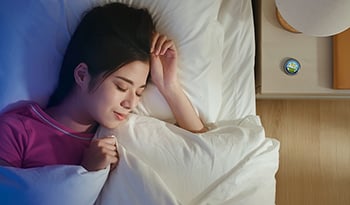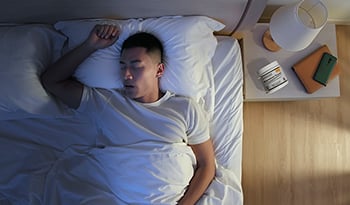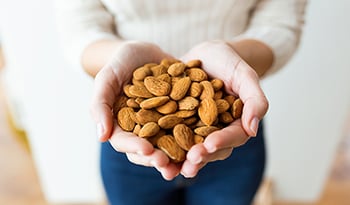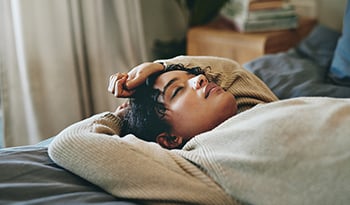7 Melatonin Alternatives For Better Sleep
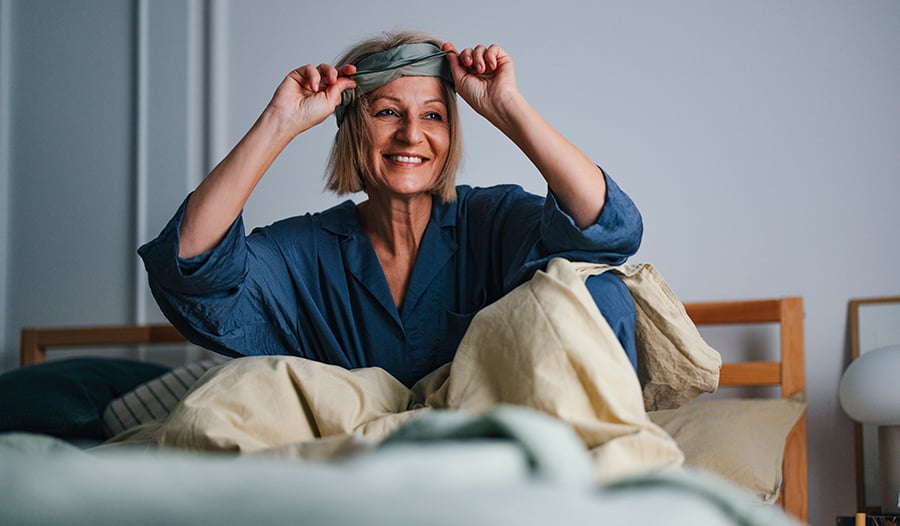
Key Takeaways
- Many people seek melatonin alternatives, with top options including 5-HTP, magnesium, glycine, and valerian.
- The most effective alternative depends on the individual's needs and the underlying cause of their sleep disturbance.
- Natural sleep aids work best when combined with healthy sleep hygiene practices like managing diet, exercise, and light exposure.
- Always consult a healthcare professional before starting any new supplement, especially if you are pregnant, taking medications, or have a chronic condition.
Why Is Melatonin So Popular?
For many, melatonin is a go-to sleep aid. It is most effective in people with circadian rhythm disruptions (such as jet lag or delayed sleep phase disorder).
But what if it doesn't work for you, causes morning grogginess, or you're simply looking for a different approach? You're not alone. For those with general insomnia, melatonin’s effectiveness is somewhat variable, leading many to explore alternative options.
Fortunately, there are many effective, science-backed melatonin alternatives that may help you get the restful sleep you need. In this guide, we'll explore seven of the best options, explaining who each one is best for.
Remember, supplements work best when paired with healthy sleep habits. For the best results, combine these alternatives with the foundational lifestyle tips at the end of this article.
Top 7 Effective Alternatives To Melatonin
Melatonin Alternatives at a Glance
There are many effective natural sleep aids, but these are the supplements that really stand out as natural alternatives to melatonin:
Alternative | Best For... |
|---|---|
Improving deep and REM sleep | |
Relaxation, muscle tension, and stress-related sleep issues | |
Lowering core body temperature to fall asleep faster without grogginess. | |
Calming a racing mind and reducing nighttime awakenings. | |
Promoting relaxation and sleep quality without sedation. | |
Reducing the time it takes to fall asleep. | |
Calming anxiety before bedtime. |
5-HTP (5-Hydroxytryptophan)
5-HTP (5-hydroxytryptophan), a metabolite of tryptophan, has more consistent effects than tryptophan in improving sleep.
Because melatonin is synthesized from serotonin, 5-HTP supplementation indirectly increases melatonin levels. Clinical studies show that 5-HTP is considerably more effective than L-tryptophan.
One of the key benefits of 5-HTP noted in human clinical trials is its ability to increase REM sleep (typically by about 25%) while increasing deep sleep stages 3 and 4 without lengthening total sleep time. The sleep stages that are reduced to compensate for the increases are non-REM stages 1 and 2—the least important stages.1,2
The recommended dosage is 50–150 mg 30–45 minutes before bedtime. Alternatively, 50–100 mg taken three times daily before meals may also improve mood and aid in weight management. Start with the lower dose for at least 3 days before increasing it.
Magnesium
Magnesium is an important natural sleep promoter. Magnesium’s beneficial effects on sleep come from several key actions:
- Neurotransmitter regulation: Magnesium helps balance GABA (γ-aminobutyric acid), the brain’s main calming neurotransmitter, supporting relaxation. It also reduces excitatory signaling and prevents over-stimulation before sleep.
- Muscle relaxation: It promotes muscle relaxation and reduces restless leg syndrome, which can disturb sleep.
- Stress and cortisol control: Magnesium helps regulate cortisol levels and reduces stress-induced sleep disturbances.
Human clinical research shows magnesium produces noticeable improvements in promoting a calming effect, relieving stress, and promoting overall relaxation and restful sleep. Magnesium supplementation is especially important in improving sleep in the elderly and reversing age-related alterations in brain wave tracings and brain chemistry.3-5
The recommended dosage is 250 to 300 mg at bedtime. Magnesium bisglycinate or citrate in powdered drink mixes is a great choice at this dosage level vs. tablets or capsules.
Magnesium is very safe at recommended levels. However, caution is advised for people with severe kidney impairment.
L-Glycine
Glycine is one of the most intriguing sleep aids. Glycine is an amino acid, but it is also a neurotransmitter with measurable effects on sleep physiology. Glycine doesn’t “knock you out” like melatonin or herbal sedatives. Instead, it fine-tunes the body’s natural sleep physiology.
As a neurotransmitter, glycine calms neural activity in the spinal cord and brainstem. One of the effects of taking glycine is that it lowers core body temperature by increasing blood flow to the skin, mimicking one of the body’s natural signals to initiate sleep. This lowering of nighttime body temperature, glycine appears to help synchronize circadian rhythms and sleep onset.6,7
In a human double-blind, crossover trial in subjects who complained of poor sleep, taking 3 g glycine before bedtime improved subjective sleep quality, shortened time to fall asleep, and reduced fatigue and sleepiness the next day compared with the placebo. And in another study, taking 3 g of glycine before bedtime led to shortened sleep latency, increased time in slow-wave sleep (deep sleep), and improved next-day performance on cognitive tests.8,9
Glycine, like magnesium, is super safe, suitable for children, easy to use, widely available, and relatively inexpensive.
GABA
Gamma-aminobutyric acid (GABA) is a major neurotransmitter that is abundantly and widely distributed throughout the central nervous system (CNS). GABA functions as one of the brain’s most important regulators of proper function. Insufficient levels of GABA may produce poor sleep quality, anxiety, and depression.
Taking a dietary supplement form of GABA is an obvious method to try to boost GABA effects in the brain. But it is not that simple. First, the form of GABA is important. Synthetic GABA has shown that it does not produce the same benefits as natural forms of GABA.10
Natural forms of GABA have been shown to promote improved sleep, especially with continued use.11 In one study with PharmaGABA, 38 senior-aged subjects were given 100 mg of PharmaGABA or a placebo for four weeks.12 In the PharmaGABA group, people experienced getting to sleep more easily, reduced nighttime awakenings, less drowsiness in the morning, and improved recovery. People in the PharmaGABA group also experienced a reduced frequency of nighttime urination.
Even a single administration of PharmaGABA has been shown to improve sleep. Another double-blind study assessed brain wave patterns through electroencephalography (EEG) after subjects took 100 mg of PharmaGABA or a placebo.13 The results demonstrated that PharmaGABA significantly shortened the time required to get to sleep by five minutes and increased the time of quality sleep compared to the placebo. Questionnaires showed that subjects receiving PharmaGABA had improved sleep, especially noted by their higher energy scores upon awakening.
In a study with a GABA product derived from fermented barley (Sanwa GABA), men and women between the ages of 39 and 59 years old were given either 100 mg of Sanwa GABA or a placebo 30 to 60 minutes before bedtime. Results showed GABA significantly increased deep sleep in those subjects who were over 44 years old and/or those subjects experiencing strong psychological stress or fatigue.14 In another double-blind study with Sanwa GABA, 62 subjects dealing with sleep problems, stress, and fatigue experienced significant improvements in sleep quality, subjective ratings of fatigue, and feelings of vigor and vitality.15
Recently, a GABA-producing probiotic, Lactiplantibacillus plantarum LP815™, taken as a dietary supplement, was shown to generate sustained release of GABA. This probiotic acts as a “GABA factory” to modulate mood, stress, and sleep more steadily than conventional GABA supplements.
In a randomized, double-blind, placebo-controlled clinical trial, adults with mild to moderate anxiety were given either 1 billion or 5 billion CFU/day of Lactiplantibacillus plantarum LP815™, or placebo, for six weeks. The higher 5 billion CFU/day dose delivered notably robust results in improving anxiety.16 Complementing these findings, evaluation of sleep outcomes in 139 participants (70 on LP815, 69 placebo), the group taking 5 billion CFU/day experienced significantly greater improvement in sleep scores (Insomnia Severity Index).17 In fact, 77.3% achieved a greater than 4-point improvement. Some of the metrics that improved included sleep duration, night sweats, and anxiety scores. Increased urinary GABA levels were inversely correlated with insomnia and anxiety levels. Indicating that the more GABA produced, the better the results.
Lactiplantibacillus plantarum LP815™ demonstrated a strong safety profile with no significant side effects reported.
L-Theanine
L-theanine is a unique amino acid found almost exclusively in tea (Camellia sinensis). Clinical studies have demonstrated that L-theanine reduces stress, improves the quality of sleep, diminishes the symptoms of premenstrual syndrome, heightens mental acuity, and reduces the negative side effects of caffeine.12
L-theanine is a great consideration for children at a dosage of 200 mg at bedtime. In adults, the typical dosages of 200 mg of L-theanine do not act as a sedative, but it does significantly improve sleep quality. It may be used at that dosage as a gentle way to improve sleep. For a noticeable sedative effect in adults, a higher single dosage of 300 to 600 mg L-theanine is required.
Valerian
In terms of herbal medicine, there is no question that valerian (Valeriana officinalis) is the most popular and well-studied sleep aid. Detailed clinical studies have shown valerian to improve sleep quality, reduce the time required to get to sleep, and promote restful sleep throughout the night.19 All without producing a "hangover feeling" in the morning.
In the latest study, researchers studied 80 adults with mild sleep problems who took either valerian extract (200 mg with a 2% total valerenic acid content) or a placebo for 8 weeks. The results showed that people taking valerian extract experienced better overall sleep quality, fell asleep faster, slept longer, and had more efficient sleep compared to those on a placebo. Improvements appeared as early as two weeks and continued through the full study period. Valerian also reduced anxiety and daytime drowsiness, while helping participants feel more refreshed in the morning. Advanced sleep testing confirmed longer and better sleep in the valerian group. Importantly, no safety concerns were observed.20
As a mild sedative, for best results, take valerian extract (0.8% to 2% valeric acid) at a dosage of 200 to 400 mg thirty to forty-five minutes before retiring. If morning sleepiness does occur, reduce dosage. If the dosage was not effective, be sure to eliminate those factors that disrupt sleep, such as caffeine and alcohol, before increasing the dosage.
Passion Flower (Passiflora incarnata)
Passion flower contains several bioactive constituents—including flavonoids and alkaloids (such as harman, harmaline)—that interact with the central nervous system. Preclinical evidence suggests it enhances GABA (gamma-aminobutyric acid) activity, which may explain its calming and sedative effects. Several human trials have assessed the calming effects of passionflower before surgical procedures. These studies showed that it may significantly reduce preoperative anxiety without side effects. Human studies have shown that both passionflower tea and various extracts, given for a week or two, led to significant improvements in subjective sleep quality.21-23
The recommended dosage as a sedative, 45 minutes before retiring, for the various forms of passion flower is as follows:
- Dried herb (or as tea): 4-8 g
- Tincture (1:5): 6-8 ml (1.5-2 tsp)
- Fluid extract (1:1): 2-4 ml (0.5-1 tsp)
- Dry powdered extract (2.6% flavonoids): 300-450
Foundational Habits: Your First Step To Better Sleep
Sleep is a 24-hour process influenced by daily routines, diet, activity, and stress management. Here are some key lifestyle factors that may increase the odds that a natural sleep promoter will work for you:
Optimize the Sleep Environment
Generally, people sleep best in a dark, cooler, quiet room. Use blackout curtains or a sleep mask and set the thermostat to ~65°F (20°C). White noise, earplugs, or a fan may help block disruptive sounds.
Invest in Comfort
It is amazing to think that most of us will spend 1/3 of our lives in bed. So, why not invest in a supportive mattress and pillows tailored to your comfort requirements and sleep position?
Regulate Light Exposure
Get outside or near a bright window within the first hour after waking to reinforce circadian rhythm. And reduce exposure to blue light (screens, LEDs) 1–2 hours before bed. Consider amber glasses or dimmed warm lights.
Establish Consistent Sleep Patterns
People who go to bed and wake up at the same time every day, even on weekends, tend to have fewer sleep issues. It is also helpful to dedicate 30–60 minutes before bed to calming activities (taking a bath, reading, journaling, and other self-care activities). And while naps are helpful, avoid naps late in the day: If needed, keep naps short (20–30 minutes) and before 3 p.m.
Manage Food and Drink
Many people with sleep issues are sensitive to caffeine. Best to eliminate it completely. Alcohol is another sleep disruptor that should be avoided. But the biggest dietary factor that disrupts sleep is too much sugar in the diet. It causes a blood sugar roller coaster that leads to fluctuations in cortisol and adrenaline, both of which are sleep disrupters.
Get Physical Exercise
Regular physical activity promotes deeper sleep, but avoid intense workouts within 2–3 hours of bedtime.
Calm the Body and Mind
Having peace of mind may be the biggest promoter of a good night’s sleep. To achieve that state, try meditation, deep breathing exercises, or gentle ”yin” yoga. Oh, and be sure to step away from work emails, social media, and stressful news before bed.
Frequently Asked Questions (FAQ)
What is the most effective natural alternative to melatonin?
The most effective alternative depends on the cause of your sleep issue. For stress and anxiety, magnesium or L-theanine are excellent. For difficulty falling asleep, valerian is well-studied.
Can I combine these supplements?
Some supplements, like magnesium and L-theanine, are often taken together. However, it's crucial to consult with your healthcare provider before combining different sleep aids to ensure safety.
Are these alternatives non-habit forming?
The supplements listed, such as magnesium, glycine, and L-theanine, are generally considered non-habit forming when used as directed. Valerian is also not associated with dependency, unlike some prescription sleep aids.
What if none of these supplements work?
If natural alternatives and sleep hygiene practices don't resolve your sleep issues, it's important to speak with a doctor. You may have an underlying condition that requires a different approach, such as Cognitive Behavioral Therapy for Insomnia (CBT-I).
References:
- Wyatt RJ, Zarcone V, Engelman K. Effects of 5-hydroxytryptophan on the sleep of normal human subjects. Electroencephalogr Clin Neurophysiol 1971;30:505-509.
- Soulairac A, Lambinet H. Effect of 5-hydroxytryptophan, a serotonin precursor, on sleep disorders. Ann Med Psychol (Paris) 1977;1:792-798.
- Rawji A, Peltier MR, Mourtzanakis K, et al. Examining the Effects of Supplemental Magnesium on Self-Reported Anxiety and Sleep Quality: A Systematic Review. Cureus. 2024 Apr 29;16(4):e59317.
- Abbasi B, Kimiagar M, Sadeghniiat K, et al. The effect of magnesium supplementation on primary insomnia in elderly: A double-blind placebo-controlled clinical trial. J Res Med Sci. 2012; 17(12):1161-9.
- Boyle NB, Lawton C, Dye L. The effects of magnesium supplementation on subjective anxiety and stress-A systematic review. Nutrients. 2017; 9(5):429.
- Soh J, Raventhiran S, Lee JH, et al. The effect of glycine administration on the characteristics of physiological systems in human adults: A systematic review. Geroscience. 2024 Feb;46(1):219-239.
- Bannai M, Kawai N. New therapeutic strategy for amino acid medicine: glycine improves the quality of sleep. J Pharmacol Sci. 2012;118(2):145-8.
- Yamadera W, Inagawa K, Chiba S, et al. Glycine ingestion improves subjective sleep quality in human volunteers, correlating with polysomnographic changes. Sleep Biol Rhythms. 2007;5(2):126–131.
- Inagawa K, Hiraoka T, Kohda T, et al. Subjective effects of glycine ingestion before bedtime on sleep quality. Sleep Biol Rhythms. 2006;4(1):75–77.
- Kripke DF. Hypnotic drug risks of mortality, infection, depression, and cancer: but lack of benefit. F1000Res. 2016 May 19;5:918
- Besedovsky L, Lange T, Born J. Sleep and immune function. Pflugers Arch. 2012 Jan;463(1):121-37. doi: 10.1007/s00424-011-1044-0. Epub 2011 Nov 10. PMID: 22071480; PMCID: PMC3256323.
- Brand-Miller JC, Atkinson FS, Gahler RJ, et al. Effects of PGX, a novel functional fibre, on acute and delayed postprandial glycaemia. Eur J Clin Nutr 2010 Dec;64(12):1488-93.
- Auld F, Maschauer EL, Morrison I, Skene DJ, Riha RL. Evidence for the efficacy of melatonin in the treatment of primary adult sleep disorders. Sleep Med Rev. 2017;34:10-22.
- Li T, Jiang S, Han M, et al. Exogenous melatonin as a treatment for secondary sleep disorders: A systematic review and meta-analysis. Front Neuroendocrinol. 2019;52:22-28.
- Honma K, Kohsaka M, Fukuda N, et al. Effects of vitamn B12 on plasma melatonin rhythm in humans. Increased light sensitivity phase-advances the circadian clock? Experentia 1992;48:716–20.
- Okawa M, Mishima K, Hishikawa Y, et al. Vitamin B12 treatment for sleep-wake rhythm disorders. Sleep 1990;13:1–23.
- Abbasi B, Kimiagar M, Sadeghniiat K, et al. The effect of magnesium supplementation on primary insomnia in elderly: A double-blind placebo-controlled clinical trial. J Res Med Sci. 2012 Dec;17(12):1161-9.
- Held K, Antonijevic IA, Künzel H, Uhr M, Wetter TC, Golly IC, Steiger A, Murck H. Oral Mg(2+) supplementation reverses age-related neuroendocrine and sleep EEG changes in humans. Pharmacopsychiatry. 2002 Jul;35(4):135-43. doi: 10.1055/s-2002-33195. PMID: 12163983.
- Heli Z, Hongyu C, Dapeng B, Yee Shin T, Yejun Z, Xi Z, Yingying W. Recent advances of γ-aminobutyric acid: Physiological and immunity function, enrichment, and metabolic pathway. Front Nutr. 2022 Dec 22;9:1076223.
- Hepsomali P, Groeger JA, Nishihira J, Scholey A. Effects of Oral Gamma-Aminobutyric Acid (GABA) Administration on Stress and Sleep in Humans: A Systematic Review. Front Neurosci. 2020;14:923.
- Yamatsu A, Takeshima K, Yamane T, et al. Beneficial action of GABA on sleep and frequent night urination in the elderly. Japanese Pharmacology and Therapeutics. 2013;41:985-988.
- Yamatsu A, Yamashita Y, Pandharipande T, Maru I, Kim M. Effect of oral γ-aminobutyric acid (GABA) administration on sleep and its absorption in humans. Food Sci Biotechnol. 2016 Apr 30;25(2):547-551.
- Hokazono H, Fukuda, R. Effects of oral γ-Aminobutyric acid (GABA) administration on sleep in healthy adults - A randomized, double-blind, placebo-controlled, crossover study. Japanese Pharmacology and Therapeutics. 2018;46:757-770.
- Hokazono H, Saito J. Effects of γ-aminobutyric acid (GABA)-containing food on mood status and sleep quality in worker: -A double-blind randomized controlled trial. Japanese Pharmacology and Therapeutics, 2016, 44(10), 1445-1454. |
- Grant AD, Erfe MCB, Delebecque CJ, et al. Lactiplantibacillus plantarum Lp815 decreases anxiety in people with mild to moderate anxiety: a direct-to-consumer, randomised, double-blind, placebo-controlled study. Benef Microbes. 2025 Apr 24:1-12.
- Grant AD, Erfe MCB, Delebecque CJ, et al. GABA Probiotic Lactiplantibacillus plantarum Lp815 Improves Sleep, Anxiety and Increases Urinary GABA: a Randomized, Double-Blind, Placebo-Controlled Study. medRxiv 2025.04.14.25325830
- Eschenauer G, Sweet BV. Pharmacology and therapeutic uses of theanine. Am J Health Syst Pharm. 2006;63(1):26, 28-30.
- Stevinson C, Ernst E. Valerian for insomnia: a systematic review of randomized clinical trials. Sleep Med 2000;1:91-99.
- Chandra Shekhar H, Joshua L, Thomas JV. Standardized Extract of Valeriana officinalis Improves Overall Sleep Quality in Human Subjects with Sleep Complaints: A Randomized, Double-Blind, Placebo-Controlled, Clinical Study. Adv Ther. 2024 Jan;41(1):246-261.
- Miroddi M, Calapai G, Navarra M, et al. Passiflora incarnata L.: ethnopharmacology, clinical application, safety and evaluation of clinical trials. J Ethnopharmacol. 2013 Dec 12;150(3):791-804.
- Lee J, Jung HY, Lee SI, Choi JH, Kim SG. Effects of Passiflora incarnata Linnaeus on polysomnographic sleep parameters in subjects with insomnia disorder: a double-blind randomized placebo-controlled study. Int Clin Psychopharmacol. 2020 Jan;35(1):29-35.
- Ngan A, Conduit R. A double-blind, placebo-controlled investigation of the effects of Passiflora incarnata (passionflower) herbal tea on subjective sleep quality. Phytother Res. 2011 Aug;25(8):1153-9
DISCLAIMER:This Wellness Hub does not intend to provide diagnosis...
















































































 Table of Contents
Table of Contents



